- Home
- P. D. James
The Skull Beneath the Skin Page 25
The Skull Beneath the Skin Read online
Page 25
“You’ll bring your own flasks and sandwiches, lads, and ring for no one. You’ll be beholden to Mr. Gorringe for nothing but his light and heating and the water that flushes his bog.”
He pulled the bellcord. It seemed to Buckley that Munter took his time in coming. Grogan said: “Will you tell Mr. Gorringe that we’re now leaving.”
“Yes, sir. The police launch isn’t yet sighted, sir.”
“I’m aware of that. We shall wait for it on the quay.”
When the man had gone, he said irritably: “What does he think we propose to do? Walk on water?”
Ambrose Gorringe arrived within minutes to see them off his premises with formal courtesy. They might, thought Buckley, have been a couple of dinner guests, if not particularly welcome or agreeable ones. He said nothing about the event that had brought them to Courcy and made no inquiries about the progress of the investigation. Clarissa Lisle’s murder might have been an embarrassing mishap in an otherwise not unsuccessful day.
It was good to be in the air again. The night was extraordinarily balmy for mid-September and there still seemed to rise from the stones of the terrace a genial warmth like the last breath of a summer day. Briefcases in hand, they strolled together along the eastern arm of the quay. Turning to retrace their steps, they could see in the distance a stream of light from the dining-room windows and dark figures moving to and fro on the terrace, joining then parting, pausing and then walking on as if taking part in a stately pavane. It looked to Buckley as if they had plates in their hands. Probably making do with the cold leftover party food he thought, and some irrelevant quotation about baked funeral meats came into mind. He didn’t blame them for not wanting to sit together round a table, faced with one empty chair.
He and Grogan settled themselves under the canopy of the bandstand to wait for the first lights of the launch. The peace of the night was seductive. Here on the southern shore where the mainland couldn’t be seen it was easy to imagine that the island was totally isolated in a waste of sea, that they were waiting and watching for the masts of some overdue relief ship, and that the figures gliding on the terrace were the ghosts of long-dead settlers, that the castle itself was a shell, hall and library and drawing room open to the sky, the great staircase rising into nothingness, ferns and weeds pushing their way between the broken tiles. He wasn’t normally imaginative, but now he deliberately indulged his tiredness, letting his mind elaborate the fantasy while he sat gently massaging his right wrist.
Grogan’s voice broke harshly into the reverie. Neither the peace nor the beauty had touched him. His thoughts were still on the case. Buckley told himself that he should have known there would be no respite. He remembered the overheard comment of a detective inspector: “Red Rufus treats a murder investigation like a love affair. Gets obsessed with his suspects. Moves into their lives. Lives and breathes with the case, edgy and restless and frustrated, until it climaxes at the arrest.” Buckley wondered if that was one of the reasons for his failed marriage. It must be disconcerting to live with a man who, for most of the night as well as the day, simply wasn’t there. When Grogan spoke his voice was as vigorous as if the inquiry had just begun.
“Miss Roma Lisle, cousin of the deceased, aged forty-five, shopkeeper, ex-schoolmistress, unmarried. What struck you most about the lady, Sergeant?”
Buckley dragged his mind back to the interview with Roma Lisle.
“That she was frightened, sir.”
“Frightened, defensive, embarrassed and unconvincing. Consider her story. She admits that the woodcut is hers and says that she brought it to Courcy because she thought that Ambrose Gorringe would be interested in it and would be able to advise her about its age and value. As he doesn’t claim to be an authority on early seventeenth-century manuscripts, the hope was optimistic. Still, we needn’t read too much into that. She found the thing, she thought it was interesting and she brought it with her. And now for today. She tells us that she left her cousin’s bedroom at about five minutes past one, went straight to the library and stayed there until half past two when she went up to her room. It’s on the floor immediately above the gallery and she didn’t have to pass Miss Lisle’s room to get to it. She saw and heard no one. During the hour and twenty minutes when she was in the library she was alone. Miss Gray briefly put her head round the door at about twenty past one but didn’t stay. Miss Lisle remained in the library expecting a private business call from her partner which didn’t, in fact, come through. She tells us that she also wrote a letter. Asked to produce it as a small indication of verisimilitude—not that it greatly matters—she blushes with embarrassment and says that she decided not to send it after all and tore it up. When we gently point out that there are no fragments in the library wastepaper basket she becomes even redder and confides that she took the scraps with her when she went to her room and flushed them down the W.C. All very curious. But consider something even odder. She was one of the last people to see her cousin alive; not the last, but one of the last. And she tells us that she followed Miss Lisle up to her room because she wanted to wish her good luck in the play. All very proper and cousinly. But when we point out that she’d left it rather late to get changed, she tells us that she’d decided to give the performance a miss. Would you care to propound a theory which would explain these intriguing eccentricities of behaviour?”
“She was expecting a telephone call from her lover, sir, not necessarily her partner. When it didn’t come, she decided to write to him. Then she thought better of it and tore up the letter. She retrieved the fragments from the wastepaper basket because she didn’t want us piecing them together and reading her private correspondence, however innocuous.”
“Ingenious, Sergeant. But you see where it leaves us. At the time when, according to her, she took those scraps upstairs she couldn’t have known that the police would he here to poke their inquisitive noses into anyone’s private correspondence, not unless she also knew by then that her cousin was dead.”
“And that last visit to Miss Lisle?”
Grogan said: “My guess is that it was less friendly than she makes out.”
“But why tell us about the letter, sir? She didn’t have to. Why not just say that she spent the time in the library, reading?”
“Because she’s a woman who normally tells the truth. She made no pretence, for example, of liking her cousin or being particularly grieved by her death. If she is going to lie to the police, she prefers to lie as little as possible. That way she has fewer untruths to remember and is able to convince herself that, essentially, she isn’t really lying at all. It’s a sound enough principle as far as it goes. But we shouldn’t read too much into that torn-up letter. She may merely have wanted to save the servants trouble, or have been afraid that they might have been curious enough to piece it together. And if Miss Roma Lisle’s story is less than convincing, she’s not the only one. Consider the curious reticence of the lady’s maid. It sounds like the chapter heading for one of those snobbish thirties thrillers.”
Buckley thought back over the interview with Rose Tolgarth. Before she had come in, Grogan had said to him: “You question the lady, Sergeant. She may prefer youth to experience. Give her a treat.”
Surprised, Buckley had asked: “At the desk, sir?”
“That would seem the obvious place, unless you intend to prowl round her like a predator.”
Grogan himself had greeted her and invited her to sit with more courtesy than he had shown Cordelia Gray or Roma Lisle. If she were surprised to find herself facing the younger of the two officers she hadn’t shown it. But then, she hadn’t shown anything. She had gazed at him with her remarkable eyes, with their smudgy black irises, as if she were looking into … what, he wondered? Not his soul, since he didn’t believe that he had one, but certainly into some part of his mind which wasn’t intended to be public property. All his questions had been answered politely but with the minimum of words. She had admitted that she knew about the threatening messages but
refused to speculate about who might have sent them. That job, she implied, was the responsibility of the police. It was she who had made and taken up Miss Lisle’s tea before she settled for her usual pre-performance rest. The routine was always the same. Miss Lisle drank Lapsang Souchong tea with no milk or sugar but with two thick slices of lemon put into the teapot before the boiling water was poured in. She had made the tea in the usual way in Mr. Munter’s pantry and Mrs. Chambers and Debbie had been with her at the time. She had taken up the tray immediately and at no time had the teapot been out of her sight. Sir George had been in the bedroom with his wife. She had placed the tea tray on the bedside cabinet and had then gone into the bathroom where there was a certain amount of tidying to be done before Miss Lisle took her bath. She had returned to the bedroom to help her mistress undress and had found Miss Gray there. After Miss Gray had returned to her own room, Sir George had left his wife and she herself had followed almost immediately afterwards. She had spent the afternoon preparing the ladies’ dressing room backstage and helping Mrs. Munter with the arrangements for the party. At two-forty-five she had become concerned in case Miss Gray had forgotten to call Miss Lisle and had gone herself. She had met Sir George, Mr. Gorringe and Miss Gray outside the bedroom and had then learned of Miss Lisle’s death.
They had taken her up to the bedroom and asked her to look round carefully but without touching anything, and say whether the room was as she would expect to find it, whether there was anything which struck her as unusual. She had shaken her head. Before leaving she had stood for a moment gazing over the chaise longue, the stripped and empty bed with a look which Buckley couldn’t fathom. Sadness? Speculation? Resignation? The right word eluded him. Her eyes were open but he thought he saw her lips moving. For a moment he had the extraordinary idea that she might be praying.
Back in the business room he had asked: “You were happy working for Miss Lisle? You liked each other?”
And that was as tactful a way as he knew of asking whether she had hated her employer enough to bash in her skull.
She had replied quietly: “We are used to each other. My mother was her nurse. She asked me to look after her.”
“And you can’t think of a reason why anyone should want to kill her. All one big happy family, were they?”
The attempt at Grogan-like sarcasm had been unsuccessful. She had met it with a brand of her own.
“There’s never a good reason for people to kill each other, even in happy families.”
He had had little more success with Mrs. Munter. She, too, had been a polite but unrewarding witness, saying as little as possible, resisting all his blandishments to entice her into volubility or indiscretion. Ambrose Gorringe had concealed his secrets, if any, with a spate of apparently artless conjecture. Miss Tolgarth and Mrs. Munter had concealed theirs with a silence and obstinacy which just avoided being overtly uncooperative. Buckley thought that Grogan could hardly have selected two more difficult witnesses for him to practise interrogation on. Perhaps that had been the idea. The impression they apparently wanted to convey was that murder, like most of the world’s violence, was a male concern from which, as women, they were only too happy to be excluded. From time to time he had found himself staring at them with what he was uncomfortably aware must have been obvious frustration. But human beings weren’t like school geometry problems. If you stared at them long enough, they didn’t suddenly make sense. He said: “Miss Tolgarth admits that she didn’t leave Miss Lisle until after Sir George had gone and that accords with his evidence. Miss Gray was in her own room so nobody saw her leave. She could have returned to the bathroom, pretended to busy herself with preparations for the bath, come back into the bedroom when Gray had left, and killed her mistress then.”
“The timing would be very tight. Mrs. Munter saw her downstairs in the pantry at one-twenty.”
“So she says. I got the feeling, sir, that those two are standing together. I got precious little out of either of them, Rose Tolgarth in particular.”
“Except one highly interesting lie. Unless, of course, the lady is less sharp-eyed than I give her credit for.”
“Sir?”
“In the bedroom, Sergeant. Think. You asked her if everything looked as she would expect to find it. Her answer was a nod. But visualize that dressing table. What among all that female clutter was missing, something which we would have expected to see, given the things which, in fact, we did see?”
But the launch bringing Roper and Badgett had actually touched the quay before Buckley was able to work out the answer to the conundrum.
10
And now, at last, the dreadful day was over. Soon after ten o’clock struck, one by one and with brief “goodnights,” they had crept silently to their beds. The casual night-time commonplaces had become unsayable—“I’m terribly tired. It’s been a long day. Sleep well. See you all in the morning,”—all bore a weight of innuendo, tactlessness or bad taste. Two women police officers had moved Cordelia’s things from the De Morgan room, a touch of delicacy which would have amused her had she been capable of being amused. The new bedroom was on the same gallery floor but on the other side of Simon and overlooking the rose garden and the pool. As she turned the key in the lock and breathed the stuffy, scented air Cordelia thought that it might not often be used. It was small, dim and cluttered and looked as if Ambrose had furnished it strictly in period for the edification of his summer visitors. The lightness and delicacy which he had achieved in so much of the castle was absent.
Every square inch of the walls was covered with pictures and ornaments and the ornate furniture, papier-mâché lined with mahogany, seemed to press in on her, dark and threatening. The room felt musty but when she opened wide the window the sound of the sea burst in, no longer soporific and comforting but a steady menacing roar. She lay wondering whether she could summon up the energy to get out of bed and half close the window. But that was her last conscious thought before weariness took over and she felt herself drifting unresistingly down the long stream of tiredness into sleep.
BOOK FIVE
TERROR BY MOONLIGHT
1
At nine-fifteen Cordelia went into the business room to ring Miss Maudsley, wondering as she lifted the receiver whether the police would be listening in. But monitoring private telephone calls, even from the scene of a murder, counted as phone tapping and for that the consent of the Home Secretary was surely necessary. It was strange how little she knew about a real police investigation despite Bernie’s tutelage. It had already struck her that their legal powers were a great deal less extensive than a reading of detective fiction might suggest. On the other hand, their physical presence was far more frightening and oppressive than she would have believed possible. It was like having mice in the house. They might for a time be both silent and invisible but, once known to be there, it was impossible to ignore their secret and polluting presence. Even here in the business room the force of Inspector Grogan’s rebarbative personality still lingered, although all trace of his brief occupation had been cleared away. It seemed to her that the police had left the room tidier than they had found it, and this in itself was sinister. As she dialled the London number it was difficult to believe that the call would go unrecorded.
It was a nuisance that Miss Maudsley in her cheap bed-sitting room had no private telephone. The single instrument was in the darkest and most inaccessible corner of the hall at Mancroft Mansions and Cordelia knew that she might have to wait for minutes until one of the other residents, driven mad by its insistent ring, came out to silence it, and that she would then be lucky if he understood English and luckier still if he were willing to trudge up four flights to call Miss Maudsley. But this morning her call was answered almost immediately. Miss Maudsley confided that she had bought her usual Sunday paper on the way home from eight o’clock Mass and had been crouching on the bottom step of the stairs wondering whether to ring the castle or to wait for Cordelia’s call. She was almost incoherent with a
nxiety and distress and the brevity of the press report hadn’t helped. Cordelia thought how chagrined Clarissa would be to learn that her fame, even after a violent death, didn’t justify top billing on a day when a spectacular parliamentary scandal, the death of a pop star from a drug overdose and a particularly brutal terrorist attack in Northern Italy had presented the editor with a surplus of candidates for the front page.
Miss Maudsley, her voice breaking, said: “It says that she was … well … battered to death. I can’t believe it. And it’s so horrible for you. Her husband, too, of course. That poor woman. But naturally one thinks of the living. I suppose it was some kind of intruder. The paper does say that her jewellery is missing. I do hope that the police won’t get any wrong ideas.”
And that, thought Cordelia, was as tactful a way as any of saying that she hoped that Cordelia herself wasn’t under suspicion.
Cordelia gave her instructions slowly, and Miss Maudsley made audible attempts to calm herself and listen.
“The police will be sure to check up on me and on the Agency. I don’t know the procedure, whether someone will call from the Dorset C.I.D. or whether they’ll get the Met to do it for them. But don’t worry. Just answer their questions.”
“Oh dear, yes I suppose we must. But it’s all so dreadful. Am I to show them everything? Suppose they ask to see the accounts? I did balance the petty cash on Friday afternoon, at least it didn’t balance exactly I’m afraid. Mr. Morgan, a delightful man, came to fix the name plaque.… He said that he’d leave the bill until you got back, but I sent Bevis for some biscuits for him to have with his coffee and he forgot how much they cost and we threw away the packet with the price on it.”
“They’re more likely to ask about Sir George Ralston’s visit. I don’t think the police will be interested in the petty cash. But let them see anything they ask for except, of course, the clients’ files. They’re confidential. And Miss Maudsley, tell Bevis not to try to be clever.”

 The Skull Beneath the Skin
The Skull Beneath the Skin A Taste for Death
A Taste for Death The Children of Men
The Children of Men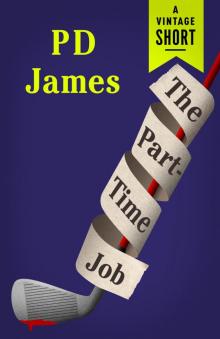 The Part-Time Job
The Part-Time Job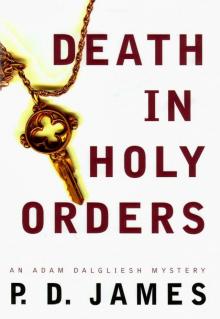 Death in Holy Orders
Death in Holy Orders The Victim
The Victim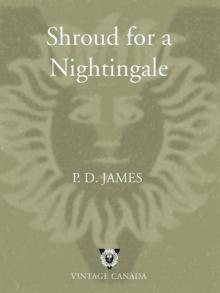 Shroud for a Nightingale
Shroud for a Nightingale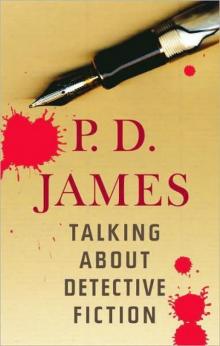 Talking about Detective Fiction
Talking about Detective Fiction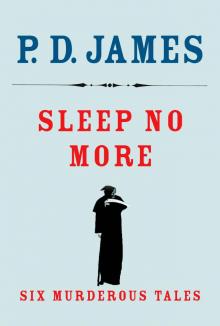 Sleep No More
Sleep No More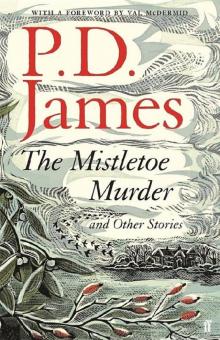 The Mistletoe Murder and Other Stories
The Mistletoe Murder and Other Stories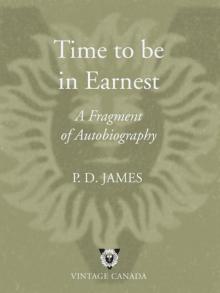 Time to Be in Earnest
Time to Be in Earnest Original Sin
Original Sin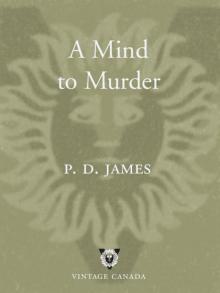 A Mind to Murder
A Mind to Murder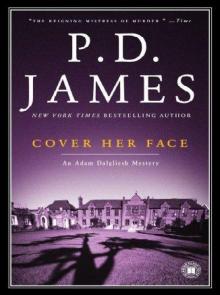 Cover Her Face
Cover Her Face Innocent Blood
Innocent Blood Devices and Desires
Devices and Desires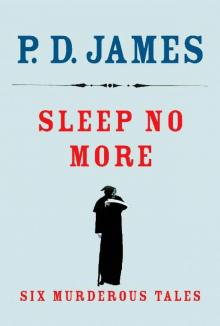 Sleep No More: Six Murderous Tales
Sleep No More: Six Murderous Tales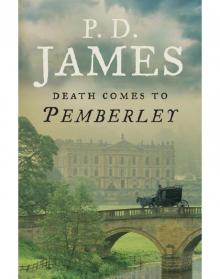 Death Comes to Pemberley
Death Comes to Pemberley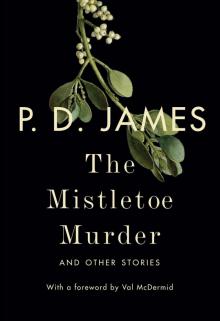 The Mistletoe Murder
The Mistletoe Murder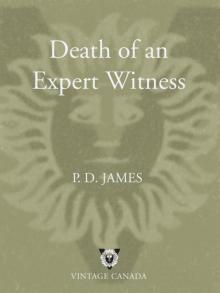 Death of an Expert Witness
Death of an Expert Witness The Private Patient
The Private Patient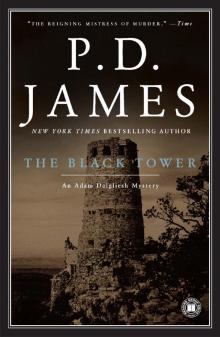 The Black Tower
The Black Tower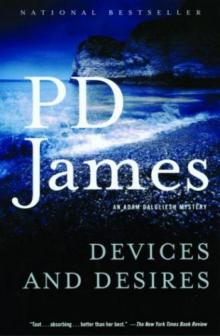 Devices & Desires - Dalgleish 08
Devices & Desires - Dalgleish 08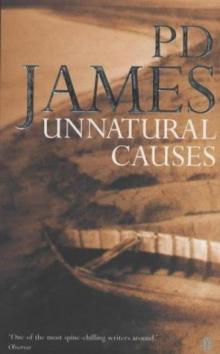 Unnatural Causes
Unnatural Causes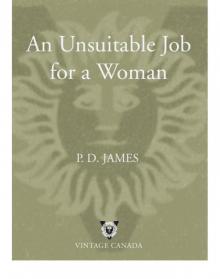 An Unsuitable Job for a Woman
An Unsuitable Job for a Woman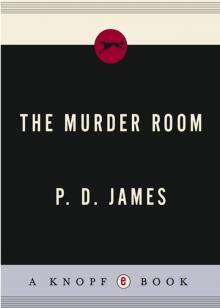 The Murder Room
The Murder Room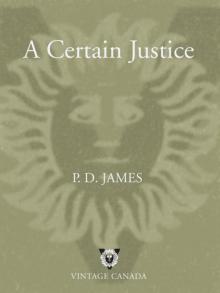 A Certain Justice
A Certain Justice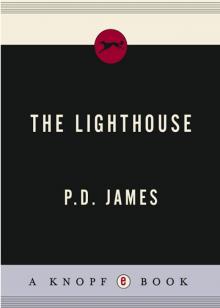 The Lighthouse
The Lighthouse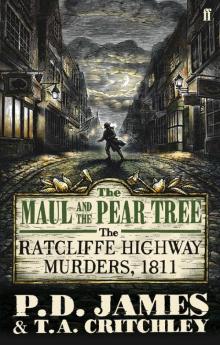 The Maul and the Pear Tree
The Maul and the Pear Tree